The evolution of friendships as individuals mature is a multifaceted process influenced by various factors that shape human connections. Understanding the intricate interplay between personal growth, external influences, and changing circumstances is crucial in comprehending how friendships transform over time. From the innocence of childhood friendships to the complexities of adult relationships, each stage offers unique insights into the dynamics of human interaction. Exploring the nuances of these changes provides valuable perspectives on the nature of friendship and the roles they play in our lives.
Key Takeaways
- Childhood friendships are marked by innocence, fun, and loyalty.
- Teenage years shape identities through peer influence and emotional support.
- Balancing responsibilities with friendships is crucial in adulthood.
- Reconnecting with old friends in middle age and exploring new social circles in retirement are common.
Childhood Friendships and Innocence
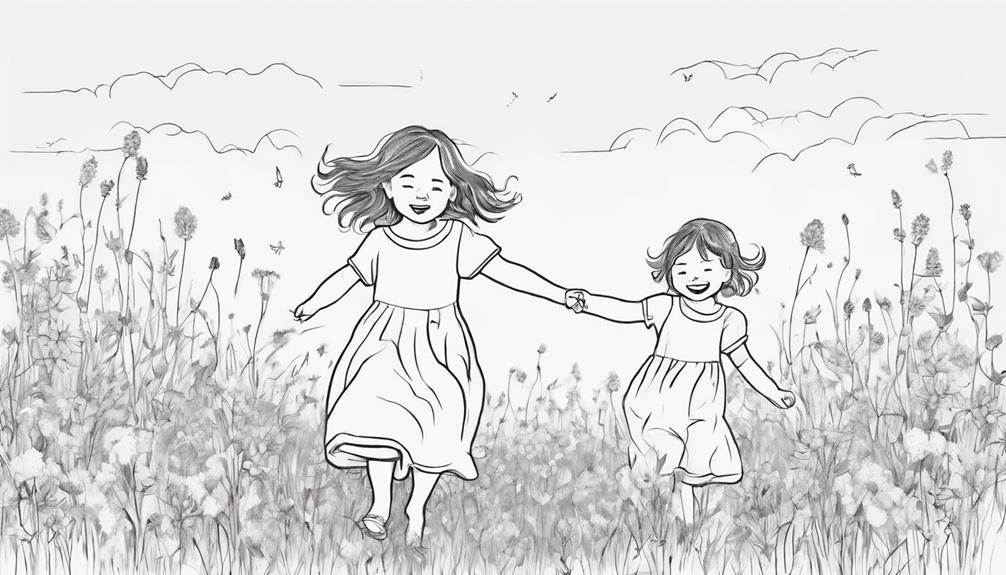
Childhood friendships, characterized by innocence and simplicity, play a crucial role in shaping individuals' social development and emotional intelligence. These early connections with friends are often based on shared activities and proximity in school or neighborhood settings. Children engage in friendships that focus on fun, play, and shared interests, establishing a foundation for social skills and emotional growth. Trust and loyalty are fundamental aspects of childhood friendships, providing a sense of security and belonging that is essential for healthy development.
Moreover, the resilience and endurance of these friendships can have a lasting impact, shaping one's social identity and influencing future relationship patterns. The innocence and purity of childhood friendships create a safe space for individuals to learn about trust, empathy, and communication, setting the stage for more complex social interactions in adolescence and adulthood. Understanding the significance of these early connections is crucial in comprehending how friendships evolve over time.
Teenage Years: Navigating Social Changes
During the teenage years, peer influence dynamics and friend group dynamics shape the social landscape for adolescents. Teenagers often navigate complex relationships influenced by their peers, leading to the formation of friend groups based on shared interests and social hierarchies. Understanding these dynamics is crucial in comprehending the evolving nature of friendships during this developmental stage.
Peer Influence Dynamics
How do peer influence dynamics shape social behaviors and decision-making processes among teenagers navigating the complexities of social changes during their formative years? During adolescence, peer influence peaks, significantly impacting social behaviors and decision-making. Teenagers exhibit heightened sensitivity to peer approval and conformity, often reshaping their social dynamics to attain acceptance within peer groups. The pursuit of popularity and social status can sway friendship choices, emphasizing the role of peers in shaping adolescent interactions. These dynamics play a crucial role in identity development and emotional support, highlighting the significance of peer relationships during the teenage years.
| Peer Influence Dynamics | |
|---|---|
| Peak during teenage years | Influences social behaviors |
| Heightened sensitivity to peer approval | Shapes decision-making |
| Shift in social dynamics | Seeking acceptance and belonging |
| Prioritization of popularity | Influence on friendship choices |
| Crucial for identity development | Provides emotional support |
Friend Group Dynamics
Navigating the intricate social landscape of adolescence, teenagers experience a dynamic interplay of group dynamics within their friend circles. During the teenage years, spending time with peers becomes paramount as adolescents seek to maintain friendships while also exploring different social identities. Friend group dynamics often involve the formation of cliques, peer pressure scenarios, and the negotiation of shifting alliances. Conflicts may arise within these circles as teenagers strive for social acceptance and navigate peer influence. These interactions play a crucial role in shaping adolescents' social skills, conflict resolution abilities, and emotional regulation. Understanding the complexities of friend group dynamics during this developmental stage is essential for comprehending how teenagers navigate social changes and form connections that impact their growth and well-being.
College and University Bonds

College and university friendships are not solely based on social interactions but are also influenced by academic collaborations that strengthen the bond. Shared campus experiences deepen the connection between individuals beyond just casual friendships. Additionally, as career aspirations intertwine, these relationships can evolve into valuable professional networks in the future.
Academic Collaborations Strengthen
Academic collaborations between individuals who formed friendships during their college or university years serve to strengthen the bonds established through shared knowledge and skills. Collaborating on research projects, papers, or presentations provides a platform for friends to leverage each other's expertise and academic backgrounds, enhancing the quality of work and deepening their connection. This shared academic experience fosters mutual respect and understanding, leading to continued growth within the friendship dynamic. A structured approach to academic collaborations not only benefits the individuals involved but also contributes to the advancement of knowledge and innovation. The table below highlights the key aspects of how academic collaborations strengthen friendships formed during college or university years.
| Key Aspects of Academic Collaborations | Benefits |
|---|---|
| Leveraging shared knowledge and skills | Enhanced quality of work |
| Fostering mutual respect and understanding | Deeper connections |
| Opportunities for continued growth | Advancement of knowledge |
| Enhancing the friendship dynamic | Innovation |
| Strengthening bonds over time | Personal and professional development |
Shared Campus Experiences Deepen
Shared experiences on campus significantly deepen the bonds among individuals who attended college or university together, fostering lasting connections through shared memories and growth. College friendships are unique in the sense that they are often built upon a foundation of common experiences and challenges faced during the formative years of higher education. Reuniting with college friends can evoke nostalgia and strengthen the bond through shared memories and inside jokes. The memories from college life play a crucial role in deepening the connection between friends, serving as a reminder of the growth and development experienced during those transformative years.
- College friendships are often built on common experiences and challenges.
- Reuniting with college friends can strengthen bonds through shared memories and inside jokes.
- Memories from college life play a crucial role in deepening the connection between friends.
Career Aspirations Intertwine
How do career aspirations intertwine to shape and strengthen the bonds among individuals who have pursued higher education together? Friendships tend to change as individuals in college or university bond over shared career aspirations. Collaborating on academic projects and studying together often solidifies relationships based on mutual career interests. Within academic settings, support networks naturally form, nurturing friendships rooted in professional ambitions. Engaging in career-related discussions and networking activities further deepens connections among peers striving for similar paths. It is common for friendships established during college and university to transition into valuable professional relationships after graduation. These interactions not only strengthen personal bonds but also create a foundation for future career growth and collaboration.
Early Adulthood: Balancing Friendships and Responsibilities
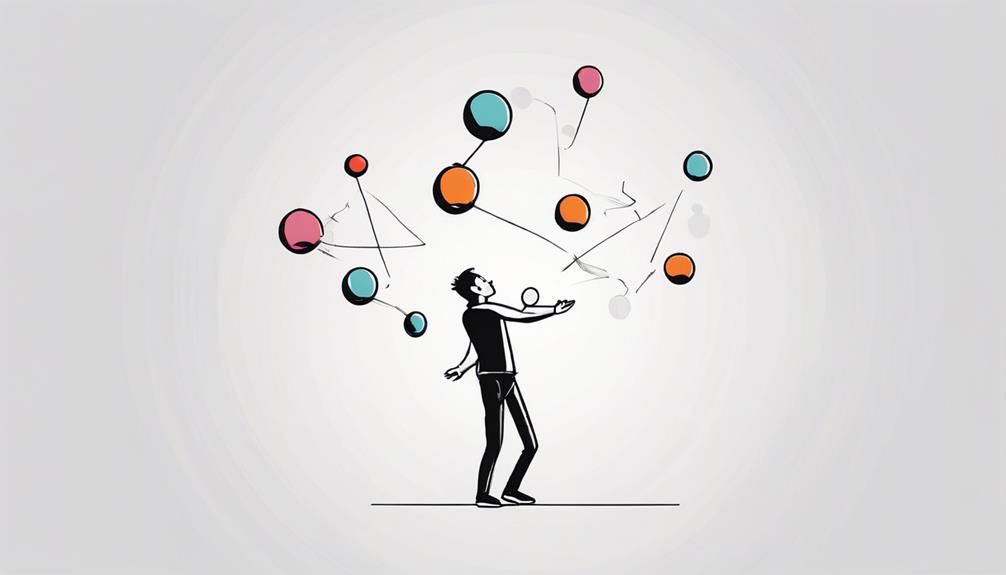
Navigating the complexities of early adulthood involves skillfully balancing the demands of burgeoning responsibilities with the maintenance of meaningful friendships. As individuals transition into this stage of life, they often find themselves grappling with the following challenges:
- Limited Time: With responsibilities piling up, the time available for social interactions diminishes, making it harder to devote sufficient time to friendships.
- Increasing Responsibilities: The growing focus on career and family responsibilities can overshadow the importance of social connections, altering the dynamics of friendships.
- Shifting Priorities: Prioritizing work commitments over social engagements can lead to a reevaluation of the types of friendships that individuals seek to nurture.
In this phase of life, understanding the evolving priorities and time constraints is vital for preserving and fostering meaningful friendships. Early adulthood serves as a critical period for individuals to strike a balance between their personal responsibilities and social relationships, setting the stage for how friendships will evolve in the future.
Establishing Career-Centric Friendships
What role do career-centric friendships play in the professional development of individuals in their 20s and 30s? Career-centric friendships are instrumental in fostering professional growth and advancement during this stage of life. These friendships are often formed based on shared career goals and challenges, providing a supportive environment where individuals can exchange insights and advice related to their work. Networking is a fundamental aspect of career-centric friendships, with connections and referrals serving as valuable resources for career progression. Whether these friendships involve colleagues, mentors, or industry peers, they contribute to building a robust network that can offer career opportunities and guidance.
Maintaining a balance between work and friendship dynamics in career-centric relationships is crucial. Clear boundaries and effective communication are essential to ensure that these friendships remain supportive and beneficial without compromising professional responsibilities. By establishing career-centric friendships, individuals in their 20s and 30s can create a supportive ecosystem that nurtures their professional development and helps them navigate the complexities of the working world.
Parenthood: Shifting Dynamics in Friendships
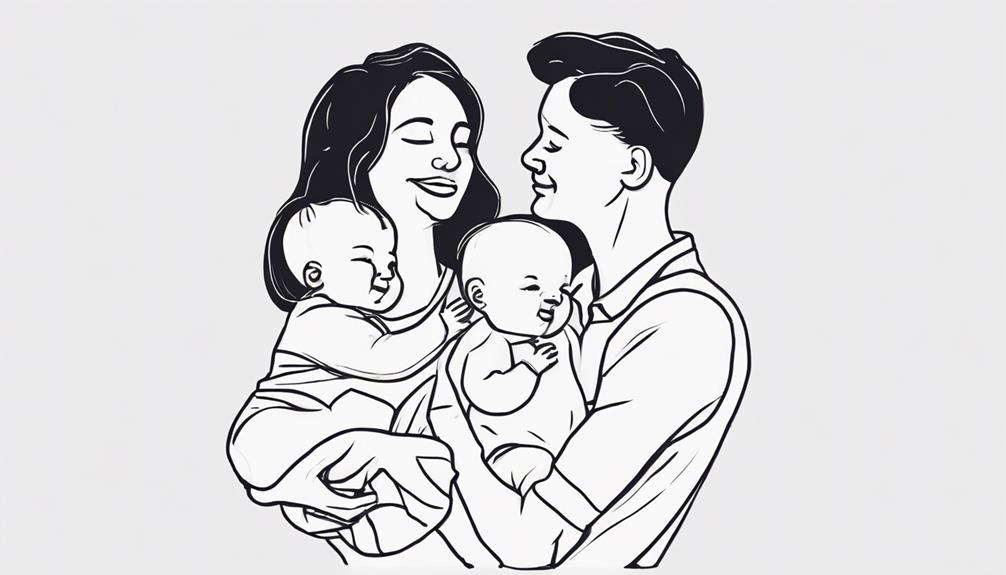
Parenthood initiates a significant transformation in the dynamics of friendships, impacting social circles and interactions as individuals navigate the responsibilities and demands of raising children. Life gets busier and more focused on family, leading to changes in social connections. When it comes to friendships during parenthood:
- Time Constraints: Parents often find themselves with limited time to invest in social relationships outside of their immediate family due to the demands of childcare.
- Making New Connections: Parenthood can also be a time where individuals make new friends within their parenting community, bonding over shared experiences and challenges.
- Evolving Priorities: As priorities shift towards raising children, some friendships may naturally fade, while others that align with the new phase of life may strengthen.
These shifts highlight the need for understanding and effort in maintaining friendships while navigating the journey of parenthood.
Middle Age: Reconnecting With Old Friends
Middle age frequently triggers individuals to reconnect with acquaintances from their past, fostering a sense of nostalgia and shared history. Rekindling friendships from earlier stages of life can provide a comforting continuity amidst the challenges of this phase. Reflecting on one's journey often prompts the desire to reach out and reconnect with familiar faces, drawing on shared memories and experiences to strengthen bonds.
| Reasons for Reconnecting | Benefits of Shared Memories |
|---|---|
| Nostalgia | Sense of Continuity |
| Reflection on Journey | Comfort Amidst Challenges |
| Desire for Familiarity | Strengthened Bonds |
The act of reconnecting with old friends in middle age goes beyond mere socializing; it delves into a shared past that can evoke emotions and a sense of belonging. Nurturing these rekindled connections can offer a valuable support system and a reminder of enduring friendships that have stood the test of time.
Retirement: Rediscovering Social Circles
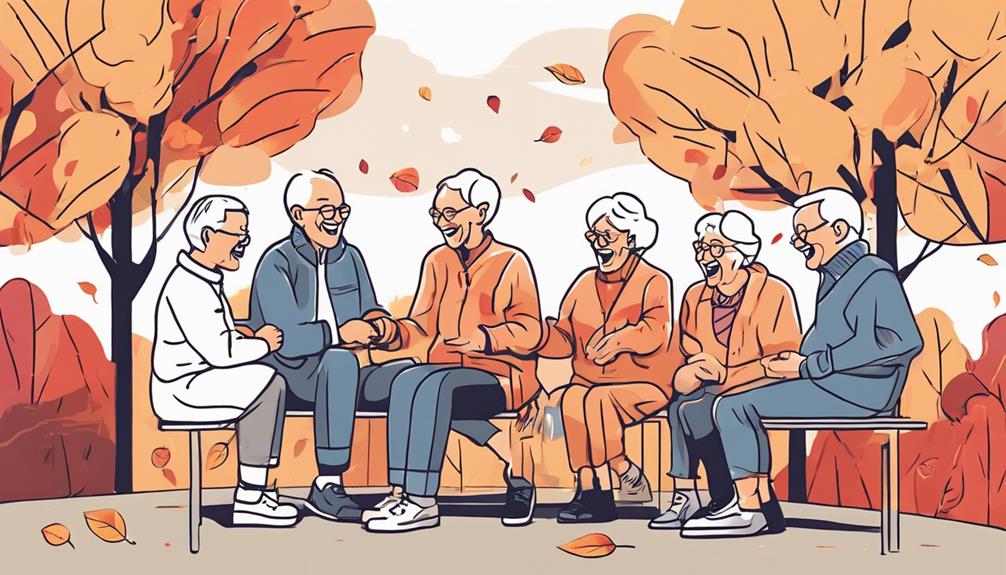
Upon entering retirement, individuals often embark on a journey of rediscovering and expanding their social circles to combat feelings of isolation and maintain mental well-being. Retirement signifies a significant life transition that can prompt personal growth and the pursuit of new friendships. To navigate this phase successfully, retirees may engage in the following:
- Joining Social Clubs: Retirement offers the opportunity to explore new hobbies and interests, leading many individuals to join social clubs or groups where they can meet like-minded peers.
- Volunteering: Many retirees find fulfillment in giving back to the community through volunteering, which not only creates a sense of purpose but also facilitates the establishment of new social connections.
- Participating in Community Activities: Involvement in community activities post-retirement exposes individuals to diverse social interactions, enabling them to make friends and cultivate meaningful relationships.
Coping With Loss and Friendship
Navigating the emotional terrain of loss in friendships entails a process of acknowledging, reflecting on, and ultimately integrating the feelings of grief and sadness that accompany such experiences. Coping with loss involves understanding that it is a natural part of life and accepting the range of emotions that come with it. Processing the loss through self-reflection and seeking support from other friends or loved ones can be beneficial in this journey. Reflecting on the positive aspects of the friendship and cherishing the memories shared can help in coping with the void left by the loss. Additionally, viewing the experience as an opportunity for personal growth and self-discovery can aid in coming to terms with the loss and moving forward positively.
| Coping Strategies | Description | Benefits |
|---|---|---|
| Self-reflection | Engaging in introspection to process emotions and memories related to the lost friendship. | Facilitates emotional healing and understanding. |
| Seeking Support | Reaching out to other friends or loved ones for comfort, empathy, and guidance during the grieving process. | Provides a sense of connection and reduces feelings of isolation. |
| Cherishing Memories | Focusing on positive moments shared with the lost friend and appreciating the impact they had on your life. | Promotes gratitude and acceptance of the past friendship. |
Technology's Impact on Modern Friendships

The advent of social media has revolutionized modern friendships, offering unprecedented convenience in staying connected. However, reliance on virtual interactions may compromise the depth and authenticity of these relationships. Balancing online communication with face-to-face interactions is crucial to nurturing meaningful modern friendships.
Social Media's Role
Social media's impact on modern friendships is undeniable, as it plays a significant role in shaping and maintaining social connections in today's digital age.
- Social media facilitates virtual connections, aiding in maintaining friendships despite physical distance.
- Technology, including social media, has been crucial in sustaining relationships during the Covid-19 pandemic.
- While social media offers benefits like staying connected, it can lead to a lack of intimacy and depth in interactions.
In navigating the realm of social media, individuals must balance digital communication with face-to-face interactions to prevent friendships from becoming superficial. Cultivating meaningful connections beyond the screen requires personal engagement to deepen bonds and sustain closeness with close friends.
Face-To-Face Interactions
With the increasing prevalence of technology in modern society, the decreasing frequency of face-to-face interactions has raised concerns about the depth and intimacy of contemporary friendships. Research indicates that overreliance on virtual communication can lead to shallower connections and reduced emotional bonding among friends. In the absence of physical presence, the development of trust and empathy in modern friendships may be hindered. Face-to-face interactions play a crucial role in building strong, meaningful connections and fostering a sense of closeness. Balancing virtual communication with in-person meetups is vital for maintaining the quality and depth of modern friendships. As technology continues to shape social interactions, finding a harmonious balance between these different paths of communication is essential for nurturing fulfilling and lasting friendships.
Mental Health and Friendships
Interpersonal relationships significantly influence individuals' mental health outcomes, with friendships playing a pivotal role in providing essential support and promoting emotional well-being. Positive friendships contribute to mental well-being by offering a support system to manage stress and alleviate feelings of loneliness. They also have a profound impact on personal growth and perspective, shaping individuals' mental health positively. Nurturing these relationships through effective communication, spending quality time together, and celebrating important milestones are key factors that can enhance mental health outcomes. Maintaining strong social connections and engaging in supportive, respectful, and open communication within friendships are crucial for overall happiness and well-being. These aspects underscore the significance of friendships in fostering mental health and highlight the need to cultivate and sustain these relationships for a positive impact on individuals' emotional well-being.
Long-Distance Friendships: Maintaining Connections
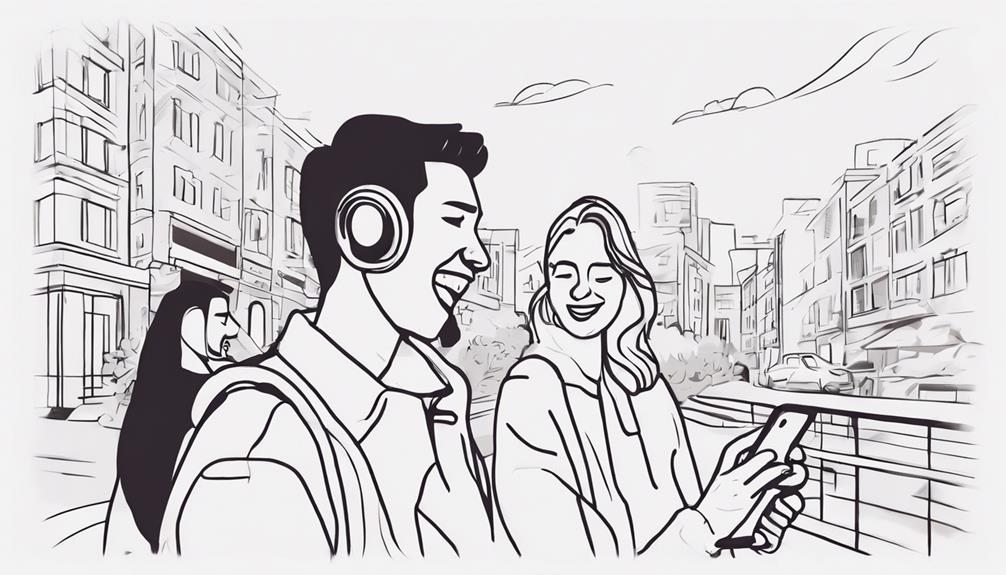
Navigating the challenges of maintaining long-distance friendships necessitates a deliberate and consistent effort to sustain meaningful connections through regular communication. When friends lead different lives in separate locations, the frequency of meetups can be hindered by busy schedules and physical distance. This can be particularly evident in friendships formed during school or college, where geographical separation and a lack of consistent interaction may cause these relationships to fade over time. The difficulty lies in transitioning from daily interactions to occasional meetings, making it challenging to sustain the same level of closeness. Despite these obstacles, maintaining long-distance friendships is possible through intentional communication. By making the effort to stay in touch through various means such as calls, texts, or video chats, meaningful connections can still be preserved. While the distance may present challenges, the bond between friends can remain strong with the right level of commitment and effort.
Cross-Generational Friendships: Benefits and Challenges
Cross-generational friendships offer unique opportunities for individuals to gain diverse perspectives and insights across different age groups, enhancing the richness and depth of their social interactions. When forming friendships with older individuals, one can benefit from their wisdom and guidance derived from a wealth of life experiences. On the other hand, connecting with younger friends brings fresh perspectives, energy, and motivation to the relationship dynamic. Interacting with both new and older friends not only broadens one's horizons but also enriches their social circles. This diverse interaction fosters personal growth by exposing individuals to varying viewpoints and approaches, contributing to a more holistic and fulfilling social experience. Embracing cross-generational friendships allows individuals to tap into a reservoir of knowledge and vitality that spans different generations, creating a tapestry of connections that transcends age boundaries.
Embracing the Evolution of Friendships

As individuals progress through life, their friendships undergo a natural evolution influenced by increasing responsibilities and the crystallization of personal values. This evolution necessitates a deeper sense of empathy, as understanding the different life stages and challenges faced by friends becomes crucial for offering meaningful support. As personal values become clearer with age, individuals are better equipped to recognize which friendships align with their beliefs and goals, leading to a natural filtering process where quality outweighs quantity in social connections. Embracing the evolution of friendships involves a willingness to adapt to changing dynamics, whether it be prioritizing face-to-face interactions over digital communication or accepting that some relationships may naturally fade as values diverge. The evolution of friendships in adulthood emphasizes the importance of genuine connections and meaningful time spent with a select few, highlighting the significance of empathy and understanding in fostering deep and fulfilling relationships.
Frequently Asked Questions
How Have Your Friends Changed as You Were Growing Up?
As I reflect on the evolution of my friendships throughout my growth, childhood bonds have transitioned from innocent play to deeper connections, while teenage drama occasionally tested the strength of these relationships. Lost connections due to diverging paths led to new beginnings with individuals who resonated more closely with my evolving values and interests. The dynamic interplay between nostalgia and growth has been evident in the ebb and flow of friendships over time.
How Does Friendship Grow Stronger?
Friendship grows stronger through the accumulation of shared experiences and emotional support. Trust and loyalty are pivotal factors that contribute to the deepening of bonds over time. As individuals navigate life's challenges together, mutual understanding and unwavering support foster a sense of security and closeness in friendships. These foundational elements, when nurtured and maintained, form the bedrock upon which enduring and meaningful relationships are built.
How Do Friendships Develop?
Friendships develop through a complex interplay of shared experiences, mutual interests, and emotional connections. Childhood bonds lay the foundation, evolving into adult connections marked by shifting dynamics and the formation of lasting bonds. Trust and communication play pivotal roles in this developmental process, fostering the growth of relationships. Understanding the nuances of how friendships develop can provide insight into the intricate nature of human connections.
How Do Friendships Change in Middle Adulthood?
Friendships in middle adulthood undergo significant transformations influenced by life transitions, demanding schedules, and evolving priorities. During this phase, individuals often prioritize quality over quantity in friendships, seeking supportive relationships built on shared experiences. Effective communication skills become crucial in maintaining connections amidst busy lives. The diverse friend groups cultivated over time reflect the depth of accumulated relationships. Nurturing these bonds requires intentional efforts to sustain meaningful connections amid the challenges of this life stage.
Conclusion
In conclusion, the evolution of friendships as individuals grow is a complex process influenced by various factors such as changing values, responsibilities, and life circumstances. While some may argue that maintaining friendships over time can be challenging, it is essential to adapt and nurture healthy connections for personal growth and well-being. By understanding the dynamics of friendships at different stages of life and being open to change, individuals can cultivate supportive relationships that withstand the test of time.
